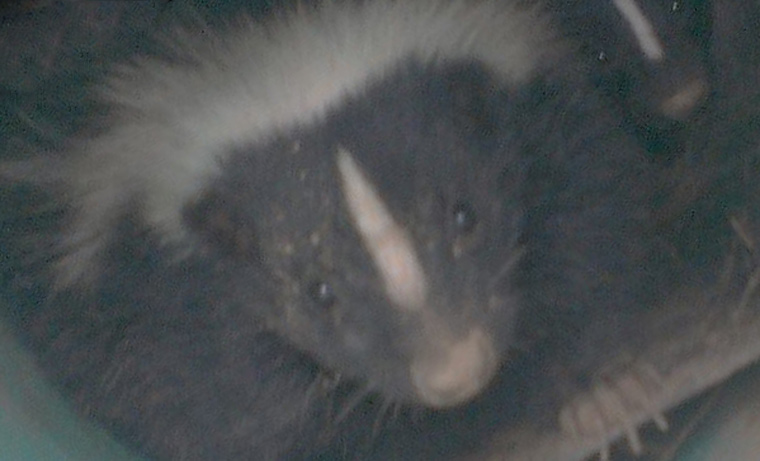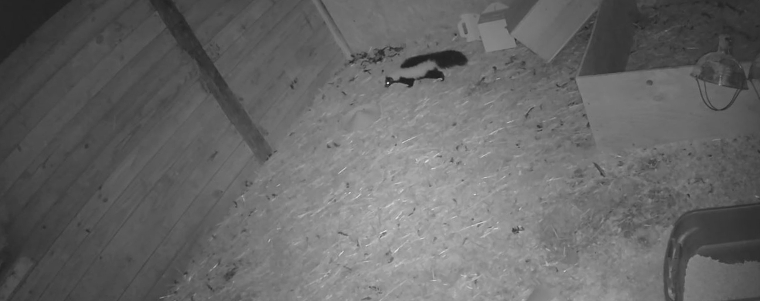-
info@aaanimalcontrol.com
Call us for help in your town
Humane Wildlife Education
Do skunks kill chickens?
Need skunk removal in your hometown? We service over 500 USA locations! Click here to hire us in your town and check prices - updated for year 2020.
You probably don't think about this, but a skunk can be just as much of a predator as a wolf or coyote. No, it is not that they are going to go out and attack people or try to take on a fox or a dog, but a skunk is the kind of animal that will eat a wide variety of foods, and that can mean that it will use its predatory instincts to be able to get food that it needs for survival.

Skunks are omnivores, meaning that they will eat both vegetation and meet. Generally, the kind of meat that a fox needs are such things as bugs, eggs, or small creatures such as lizards, toads, and frogs. These are easily captured by the skunk, because this animal has long claws that enable it to be able to puncture the outer skin of its prey, kill it, and then tear it apart to be able to eat.
While skunks normally keep their predatory focus on smaller kinds of animals, there can be instances where they will try to attack larger ones. If you are a farmer or a person who likes to raise their own chickens, you may wonder if skunks kill chickens?
The answer to this question is yes. There are really two reasons why a skunk would kill a chicken. First of all, a skunk is not going out of its way to try to kill a chicken for food. If there are other sources for a meal out there for it, then it will after a chicken.
One of the kinds of foods that a skunk truly enjoys our eggs. In this way is very much like a fox, and so it will devour the eggs of such things as snakes, birds, and other kinds of animals. If it comes across a chicken coop where there are eggs that are present, and it finds that a chicken is standing in the way of its ability to get those eggs, then it may lash out at the chicken to be able to kill it so that it has access to the eggs. In this way, it is not looking to kill the chicken for food, but only to stop it from trying to get the skunk to go away.
However, there are instances where a skunk is hungry enough that it will go directly after a chicken to get food. This is why it is important if you live in an area where there are skunks that are known to be present that you do all that you can to keep these animals from having access to your chickens.
Because of their incredibly long and sharp claws, they are able to do serious damage to virtually any animal that they come across, and your chickens would be no match against a skunk. This means that you have to protect them to keep them safe, so having them caged at night so that the skunk not have access is extremely important.
Do skunks attack chickens?
Need skunk removal in your hometown? We service over 500 USA locations! Click here to hire us in your town and check prices- updated for year 2020.
If you've ever watched the Disney Movie, Bambi, you'll probably think of the skunk as quite a cute and bashful animal, small, black and white, and relatively harmless. This is probably the case when these critters are out in the wild, doing the things that make them wild out of your eyesight. When the skunks get too close, however, the story and your opinion of them will change.

What do skunks eat?
Skunks, just like opossums, raccoons, and other wild critters, are scavengers and omnivores. This means that they eat a mixture of both plant-based and animal/meat-based foods. They have a clever ability of being able to adapt their diet a little, to better match the habitat they are surrounded by, and also the foods that are readily available. In the summer, skunks will take full advantage of the plentiful insects around. Crickets, beetle larvae, bees, grasshoppers, beetles, and other insects become the best item on the menu. During the winter these foods aren't quite so readily available. Flowers close up and die, insects have nothing to come out for ... If the skunks were to rely on this food source alone, it wouldn't take long for them to die, especially if you were talking about a mother skunk with some young to take care of and feed.
When the weather turns and temperatures plummet, the skunks need to find something else to feast on. Pet food and bird seed come in handy, especially if has been left out by unsuspecting people. Garbage cans and bags provide plenty of leftovers too, an opportunity that isn't just jumped on by skunks alone. Things that are growing in your garden aren't safe either, as plant-based materials become one of the most important items on the menu. Nuts and fruits complete the deal, but if the skunk were to come across a carcass that had been left behind by another wild animal, they'll jump at the chance to feast on it. They will also overpower smaller animals if they have the opportunity to, and these will include rodents, such as mice and rats. Skunks are regularly known to fall prey to passing victims as they desperately gorge on roadkill meat in the middle of the road. There is virtually nothing that this animal won't eat. Scavengers have no choice but to eat in this manner, otherwise they wouldn't be able to survive for very long, especially not in this human-orientated day and age.
Do skunks attack chickens?
Of course, one opportunity that a passing scavenger, such as the skunk, won't be able to pass up is one that includes a number of food items in one cage. That's essentially what a chicken coop is to a passing wild critter. It's like walking right by a lobster tank and choosing the one that you'd like to eat. Sadly, it's often the eggs that the skunks and other wild beasts get in there for, but killing and feasting on your chickens is just a bonus part of the quest.
What can you do to protect your chickens against skunks?
Luckily, you can protect your chickens from a skunk scavenger. Skunks and other animals that are likely to prey on your chickens will usually come out at night. If you do not already, you should aim to have all of your birds inside a coop for the night, only to be let out again in the morning.
The coop itself will need to be secured. You can't just expect a wooden box with a latch to do the job either. Raccoons have very dextrous paws and a very smart mind. They've learned how to open residential and commercial doors and windows, and they've even learned how to push over garbage cans to be able to get to the delights inside. If the coop has just a latch to protect it, it won't be long before one animal or another manages to get inside. You must also remember that rats can chew through wood with ease, as can other rodents and wild animals. Wood is not a sturdy enough material to put your trust in.
A chicken coop should have an additional layer of protection — chicken wire. This can be added to the entire exterior of the coop, providing a physical barrier that skunks and other wild animals can't easily get through. If you ensure that the coop has been entirely protected from above and below the ground, and the chicken wire, hardware cloth, or mesh wire has been affixed properly, your chickens in the coop should be safe.
You mustn't forget about that underground level of protection that we mentioned too. You could build a trench around the coop, adding a foot-plus deep wall of mesh wire, or even a couple of walls on the hardest hit chicken coops and areas of your land. This will prevent these animals from being able to get in from all angles, including burrowing and digging deep below the ground.
For more information, you may want to click on one of these guides that I wrote:
How much does skunk removal cost? - get the lowdown on prices.
How to get rid of skunks - my main skunk removal info guide.


















